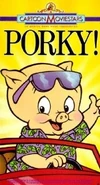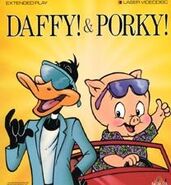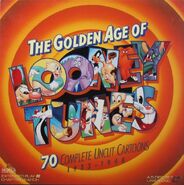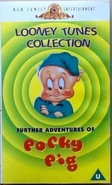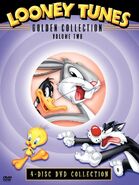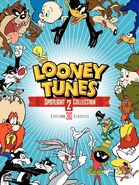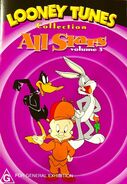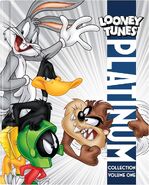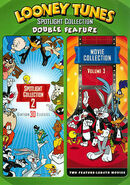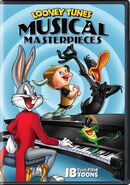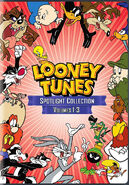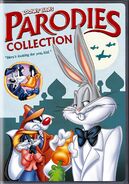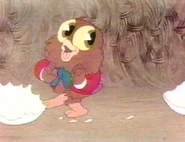I Love to Singa is a 1936 Merrie Melodies short directed by Tex Avery.
Plot[]
A young owlet named Owl Jolson, born in a family of classical cantor music-loving, anti-Jazz owls, wants to sing jazz instead of indulging in his parents' more traditional and stodgy tastes, such as "Drink to Me Only with Thine Eyes" to piano accompaniment. The fact that Owl Jolson sings jazz as opposed to classical cantor music unlike his three older brothers makes his mother faint out of disbelief and frustrates his Jewish-accented disciplinary father, Fritz Owl.
Soon enough, Fritz Owl gets fed up with his son singing jazz which goes against the family values despite the family's best attempts to make him sing classical cantor like the rest of the family, and kicks his son Owl Jolson out, where he runs off to enter a radio amateur contest. While kicking his son out of the house, Fritz Owl rants "You hotcha! You crooner! You falsetta! You jazz singer! You...you...you...!" He angrily slams the door, then suddenly reopens it to add "...phooey!", which Owl Jolson admits how neglectful his father is ("That's my....pop!"). Fritz Jolson's kinder and more sympathetic wife gets worried of their youngest owlet, claiming that Fritz's actions to be too hasty, and starts tearfully calling the police to find Owl Jolson. While listening to the police band radio broadcast, Fritz's wife worries aloud "I wonder if they found my little boy," to which the policeman heard on the radio replies, "No, we didn't, lady!"
Meanwhile, over at the a radio amateur contest, there is a series of comical radio audition gags, all which were rejected by the contest's radio host, Jack Bunny (a rabbit caricature of Jack Benny):
- A green canary playing a few bars of "Listen to the Mockingbird" on the harmonica.
- A blackbird in the blue jacket playing a few bars of "Nola", composed by Felix Arndt, on the saxophone.
- A bluebird with the accordion briefly playing "Turkey in the Straw" on the accordion.
- A black, operatic bird singing a line from the silent film Laugh, Clown, Laugh, even though the lyrics to the theme song don't have those actual words (this version was later used in "Yankee Doodle Daffy" when Porky Pig opened the door and saw Daffy Duck dressed as the clown singing, then shut the door).[5]
- An overweight female hen (voiced by Berneice Hansell) got only a few notes of "I'm Forever Blowing Bubbles" sung in an impossibly high-pitched voice before being rejected. But due to the hen's chubby appearance, she is much too wide to fall all the way through the trap door, so she continues singing while stuck in the trap door at the midsection. Jack Bunny takes the matter into his own hands, and swiftly conks the hen across the head with a mallet, knocking her down the trap door. Once she falls into the trap door, a loud crash is heard.
- A country bird stuttered through the first and almost all of the second verse of the nursery rhyme "Simple Simon" before rejecting himself.
Fritz's wife hears her son on the radio, and she and the rest of the family go to see their son. When the owlet finds out about his family's presence, he starts singing badly "Drink to Me Only with Thine Eyes". The radio show host is then about to activate the trap door, until Fritz suddenly realizes his son's true potential and allows him to freely sing jazz, which is soon followed with the entire family joining Owl Jolson singing and dancing to jazz. The owlet receives first prize for the contest. As the cartoon irises out, the first place trophy still remains on the black screen, but not until Owl Jolson reopens the screen using the iris-out and takes it back.
Availability[]
Cartoon Moviestars Porky!
Cartoon Moviestars Daffy and Porky!
The Golden Age of Looney Tunes, Volume 1, Side 1, 1930s Musicals
The Golden Age of Looney Tunes, Volume 1, 1930s Musicals
Looney Tunes Golden Collection Volume 2, Disc 4 (restored, with original opening and credits)
Looney Tunes Spotlight Collection: Volume 2 Disc 2
Looney Tunes Collection All Stars Volume 3
Looney Tunes Platinum Collection: Volume 1, Disc 2 (restored, with original opening and credits)
Looney Tunes Platinum Collection: Volume 1, Disc 2 (restored, with original opening and credits)
Looney Tunes Spotlight Collection Volumes 2-3 Repack
Looney Tunes Musical Masterpieces (restored, with original opening and credits)
Music Triple Feature
Looney Tunes Spotlight Collection Volumes 1-3 Repack
Looney Tunes: Parodies Collection (restored, with original opening and credits)
Streaming[]
Censorship[]
When this cartoon was shown on TNT's short-lived series, The Rudy and Gogo Show, two scenes were edited for time constraints (other airings of this cartoon outside TNT's The Rudy and Gogo Show were instead shown uncut, including on TBS, Cartoon Network and Boomerang) [6]:
- Owl Jolson being forced to sing "To Cilia" and interjecting it with "I Love to Singa" before his parents catch him and he gets thrown out of the house.
- Some of the failed auditions for Jack Bunny's radio program.
Notes[]
- As with many early Warners cartoons of the 1930s it is in a sense a music video designed to push a song from the Warners library.[7]
- The song, "I Love to Singa", was first written by Harold Arlen and Yip Harburg for the 1936 Warner Bros. feature-length film The Singing Kid. It is performed three times in the film: first by Al Jolson and Cab Calloway, then by the Yacht Club Boys and Jolson, and finally again by Calloway and Jolson. During this period, it was customary for Warners to have their animation production partner, Leon Schlesinger Productions, make Merrie Melodies cartoons based upon songs from their features.
- The short, one of the earliest Merrie Melodies produced in Technicolor's 3-strip process, is considered by many as one of Avery's early masterpieces.
- The first owlet hatched sang the opening bars of "Chi mi frena in tal momento", from the opera Lucia di Lammermoor. (Papa Fritz compared him to the great opera singer Enrico Caruso.) Translated in Italian is "Who is holding me back at this time?"
- The second owlet to hatch played the beginning of "Träumerei" by Robert Schumann on the violin. (Papa Fritz compared him to the violinist Fritz Kreisler.)
- The third owlet, a flautist, played the first notes of "Spring Song" by Felix Mendelssohn from his work Songs without Words.
- Owl Jolson is made to sing (badly and off key, due to his loathing of classical music) "Drink to Me Only With Thine Eyes", the lyrics of which are Ben Jonson's 1616 poem "Song. To Celia." Whenever Mama had to pause playing her piano to turn the sheet music page, Jolson reverted to "I Love to Singa".
- The radio show host is a rabbit named Jack Bunny, an obvious reference to Jack Benny. However, the auditions themselves and the moderator's rude dispatch of untalented contestants appear to be a takeoff on another popular radio show of that era, The Major Bowes Amateur Hour.
- The radio station call letters are G-O-N-G, another Major Bowes-type reference.
- Jack Benny would be caricatured as a rabbit again in "Goofy Groceries" (1941) directed by Bob Clampett five years later, albeit with a radically different character design. Meanwhile the name "Jack Bunny" would later be re-used as the name of the human Jack Benny caricature in "Malibu Beach Party" (1940) directed by Friz Freleng four years later.
- The entire Amateur Hour scene from this cartoon is later used as the entire plot device for "Hamateur Night" (1939), which was also directed by Tex Avery, where the rejected stage acts often get rejected with a trap door the same way as this cartoon.
- Twice Fritz Owl says, "Enough is too much!" which is an oxymoron, since "enough," by definition, can not be "too much."
- The PAL 1995 Dubbed Version print replaces the original ending title card with 1947-1948 Merrie Melodies dubbed ending rings.[8]
- The commentary audiotrack for this short with Eric Goldberg released on Looney Tunes Platinum Collection: Volume 1 was recorded on the 1944 Blue Ribbon reissue audiotrack as opposed to the original 1936 release audiotrack.
- Starting with this short, the "!" in "That's all Folks!" is placed inside of the quotation marks. This would be permanent going forward, except for the second half of the 1937-1938 season where there were no quotation marks at all.
In Popular Culture[]
The cartoon has, in recent years, taken on something of a cult following:
- In the "Cartman Gets an Anal Probe" episode of the adult cartoon South Park, Eric Cartman and Officer Barbrady lapse into Owl Jolson's odd song-and-dance routine whenever they get hit with an alien beam. In general, the excessively rounded faces of the South Park characters echo those of early cartoon characters, including the owls in "I Love to Singa".
- In Warners' 2003 film Looney Tunes Back in Action, Owl Jolson's dance sequence from I Love to Singa repeatedly appears on the ACME chairman's video screen, since he cannot properly operate his remote control.
- The song also appears as a Merrie Melodie sung by Gossamer in The Looney Tunes Show episode "Gribbler's Quest". In addition, Owl Jolson appears only in The Looney Tunes Show opening.
Gallery[]
References[]
- ↑ Catalog of Copyright Entries
- ↑ (3 October 2022) Cartoon Voices of the Golden Age, Vol. 2 (in en). BearManor Media, page 44.
- ↑ https://www.youtube.com/watch?v=URBQttZUsV0&ab_channel=JoshH
- ↑ https://tralfaz.blogspot.com/2021/01/gonging-simple-simon.html
- ↑ My Time is Your Time. The Odd Couple. Retrieved on 2012-09-19.
- ↑ http://www.intanibase.com/gac/looneytunes/censored-i-j.aspx
- ↑ I Love To Singa at the Big Cartoon DataBase
- ↑ https://www.youtube.com/watch?v=AX0F3FkIuUY&feature=youtu.be
External Links[]

